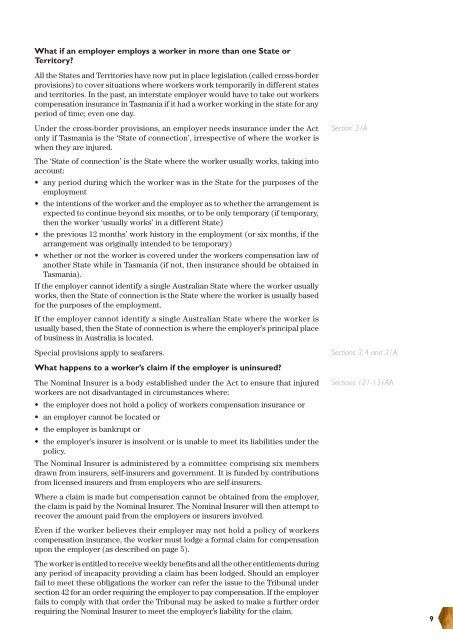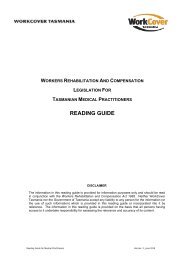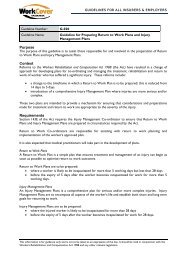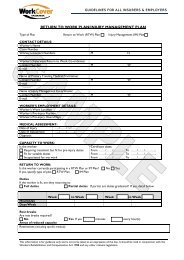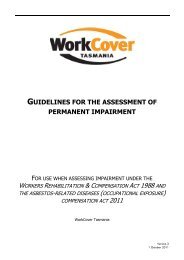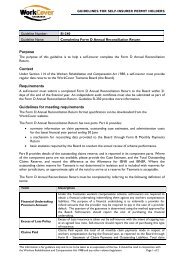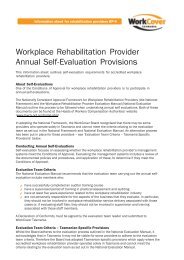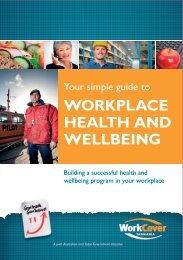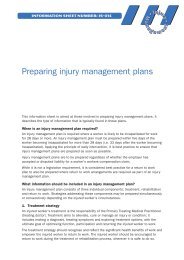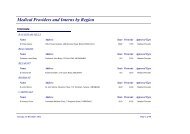Guide To Workers Compensation In Tasmania - WorkCover
Guide To Workers Compensation In Tasmania - WorkCover
Guide To Workers Compensation In Tasmania - WorkCover
Create successful ePaper yourself
Turn your PDF publications into a flip-book with our unique Google optimized e-Paper software.
What if an employer employs a worker in more than one State orTerritory?All the States and Territories have now put in place legislation (called cross-borderprovisions) to cover situations where workers work temporarily in different statesand territories. <strong>In</strong> the past, an interstate employer would have to take out workerscompensation insurance in <strong>Tasmania</strong> if it had a worker working in the state for anyperiod of time; even one day.Under the cross-border provisions, an employer needs insurance under the Actonly if <strong>Tasmania</strong> is the ‘State of connection’, irrespective of where the worker iswhen they are injured.The ‘State of connection’ is the State where the worker usually works, taking intoaccount:• any period during which the worker was in the State for the purposes of theemployment• the intentions of the worker and the employer as to whether the arrangement isexpected to continue beyond six months, or to be only temporary (if temporary,then the worker ‘usually works’ in a different State)• the previous 12 months’ work history in the employment (or six months, if thearrangement was originally intended to be temporary)• whether or not the worker is covered under the workers compensation law ofanother State while in <strong>Tasmania</strong> (if not, then insurance should be obtained in<strong>Tasmania</strong>).If the employer cannot identify a single Australian State where the worker usuallyworks, then the State of connection is the State where the worker is usually basedfor the purposes of the employment.If the employer cannot identify a single Australian State where the worker isusually based, then the State of connection is where the employer’s principal placeof business in Australia is located.Special provisions apply to seafarers.What happens to a worker’s claim if the employer is uninsured?The Nominal <strong>In</strong>surer is a body established under the Act to ensure that injuredworkers are not disadvantaged in circumstances where:• the employer does not hold a policy of workers compensation insurance or• an employer cannot be located or• the employer is bankrupt or• the employer’s insurer is insolvent or is unable to meet its liabilities under thepolicy.The Nominal <strong>In</strong>surer is administered by a committee comprising six membersdrawn from insurers, self-insurers and government. It is funded by contributionsfrom licensed insurers and from employers who are self-insurers.Where a claim is made but compensation cannot be obtained from the employer,the claim is paid by the Nominal <strong>In</strong>surer. The Nominal <strong>In</strong>surer will then attempt torecover the amount paid from the employers or insurers involved.Even if the worker believes their employer may not hold a policy of workerscompensation insurance, the worker must lodge a formal claim for compensationupon the employer (as described on page 5).The worker is entitled to receive weekly benefits and all the other entitlements duringany period of incapacity providing a claim has been lodged. Should an employerfail to meet these obligations the worker can refer the issue to the Tribunal undersection 42 for an order requiring the employer to pay compensation. If the employerfails to comply with that order the Tribunal may be asked to make a further orderrequiring the Nominal <strong>In</strong>surer to meet the employer’s liability for the claim.Section 31ASections 3, 4 and 31ASections 121-131AA9


